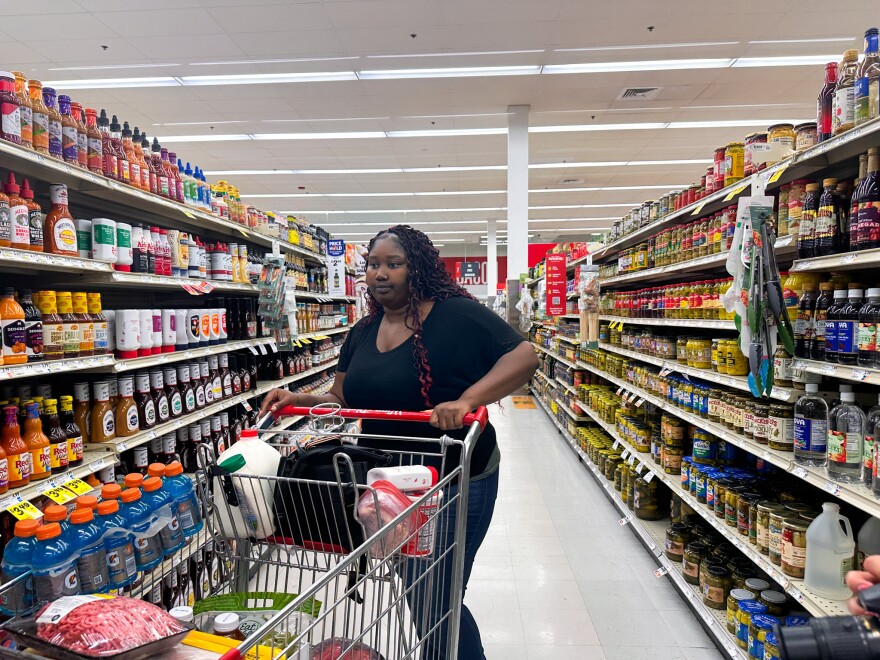Food was tight for Taylour Grant before the federal government shut down.
"Last month, we went two weeks, maybe more, with barely making it, barely eating," she said.
Grant is a single mother of four living in Tampa who relies on food assistance. She said the government shutdown is adding to uncertainty about putting food on her table.
"If they don't open back up soon, I don't know if I'm going to get benefits after this month," she said.

Stopgap measures could keep food benefits afloat
Funding for the federal government's day-to-day operations expired at midnight on Sept. 30.
This freeze, also known as a government shutdown, hamstrings programs like the Supplemental Nutrition Assistance Program (SNAP) and the Supplemental Nutrition Program for Women, Infants and Children (WIC) until lawmakers agree on a future spending plan.
READ MORE: Wasserman Schultz hosts roundtable on impact of federal government shutdown on 'healthcare crisis'
In Florida, nearly 3 million people rely on these programs to feed their families.
The good news is: food benefits are safe for the immediate future.
"First and foremost, families should know that they should continue to use their SNAP and WIC benefits and their children should continue to get school meals each day," No Kid Hungry Florida director Sky Beard said. "However, as this government shutdown draws on, there will be increasingly serious consequences for the millions of Floridians participating in these federal nutrition programs."
SNAP funding will last through October
This month is business as usual, according to Gina Plata-Nino, the SNAP deputy director of the Food Policy Action Center (FRAC).
"SNAP benefits for October are there," she said.
If the government shutdown extends beyond mid-October, there's a contingency plan that permits the U.S. Department of Agriculture, which oversees SNAP, to dip into reserve funds to keep the program going. It would also cover states' administrative program costs.
"We knew that there were about $6 billion, but it's unclear how much remains, or whether you know, USDA will go ahead and use it," Plata-Nino said.
Even if the USDA taps into reserve funds, November benefits could be delayed or interrupted if the federal department "fails to instruct states to transmit the necessary electronic files on time," according to a blog post by FRAC.
Like most federal departments, Plata-Nino said the USDA is facing "a human capacity issue" that's been worsened by furloughs and threats of permanent staff reductions amid the current government shutdown.
White House to prop up WIC with tariff money
Since Oct. 1, food policy experts have raised alarms about dwindling WIC funding during the government shutdown.
The program supports around 7 million low-income pregnant women, new mothers and babies, including around 400,000 beneficiaries in Florida. The assistance can be used to buy fresh produce and get support for breastfeeding and nutrition education.
Unlike past shutdowns — like the five-week partial shutdown that ended in January of 2019 — states have not received any money for the fiscal year 2026 in this current situation.
This raises the stakes of the shutdown, said Kate Scully, deputy director of WIC at the Food Research Action Center.
On Tuesday, the Trump administration announced it would temporarily fund WIC using revenue from tariffs.
"We're hopeful that this funding comes through. We're hopeful that tariffs come through, or that the states will step up, so that there's no gaps in services," Scully said.
While food policy experts welcome efforts to keep the program operational, groups said the legality and logistics of the funding plan are still unclear.
"Families need long-term stability, not short-term uncertainty. We still don't know how much funding this measure provides, how quickly states will receive it, or how long it will sustain operations," Georgia Machell, CEO of the National WIC Association, wrote in a statement.
Scully said FRAC is hearing reports that some WIC agencies are considering the possibility of temporary closures, pausing new applications and using state funds to pay for the program with the hope of federal reimbursement.
For now, she said it hasn't come to that.
"What we're encouraging people to do is to check with their state agency to see if there are any changes, but to continue to use their benefits and go to scheduled appointments, because right now there's not a wide-scale disruption in the process," she said.
Gabriella Paul covers the stories of people living paycheck to paycheck in the greater Tampa Bay region for WUSF. Here's how you can share your story with her.
Copyright 2025 WUSF 89.7





